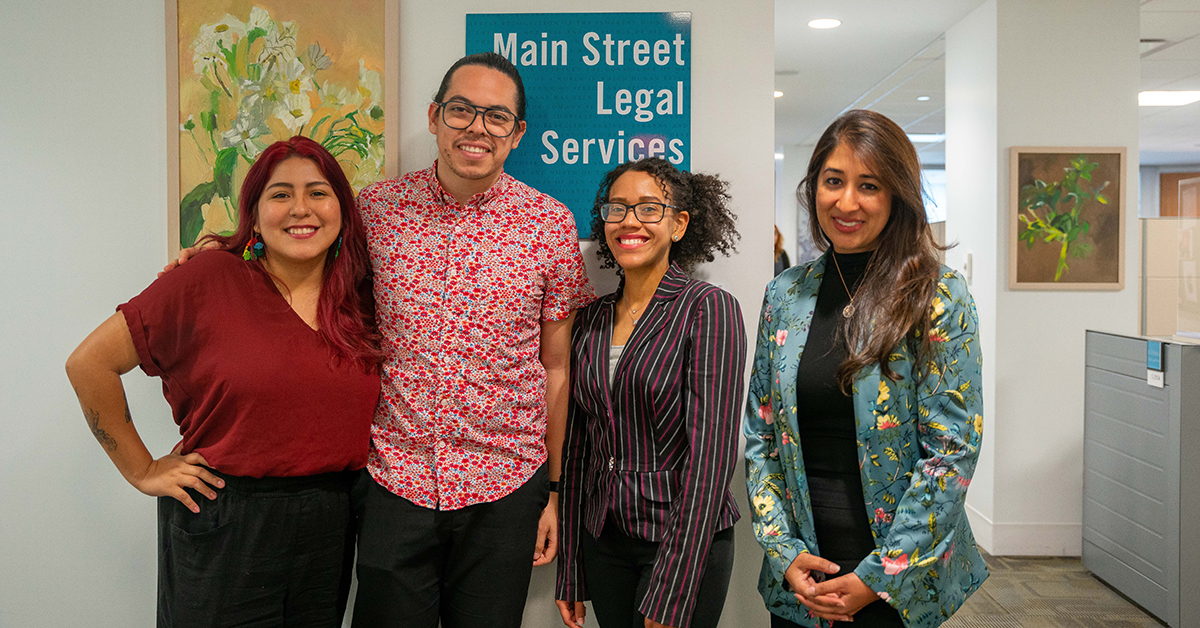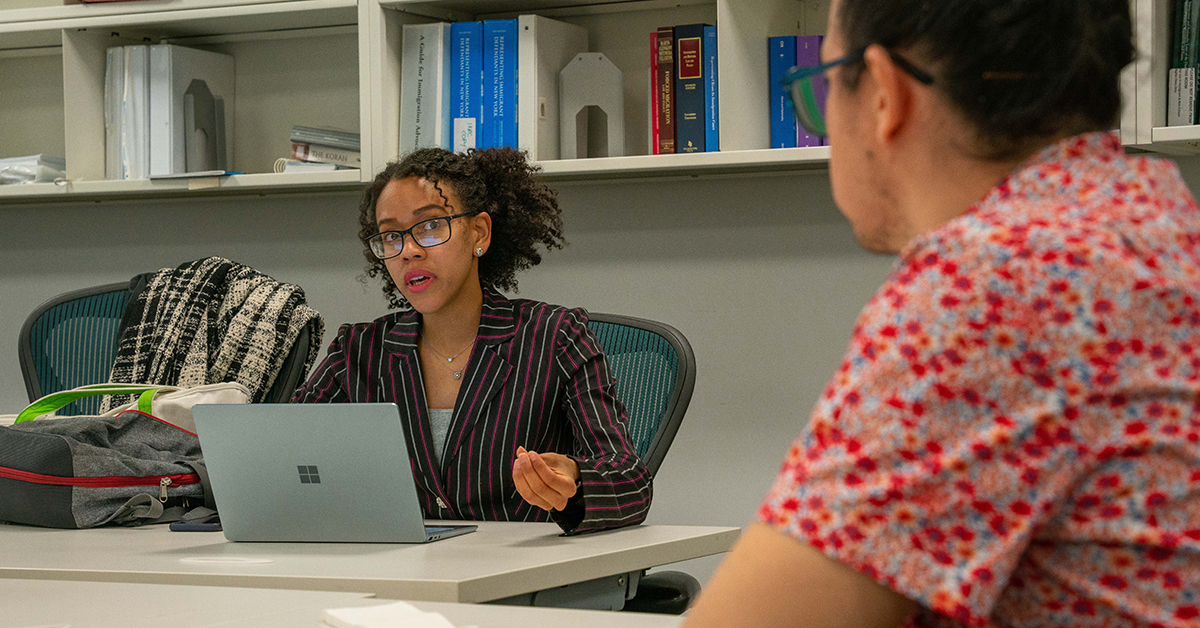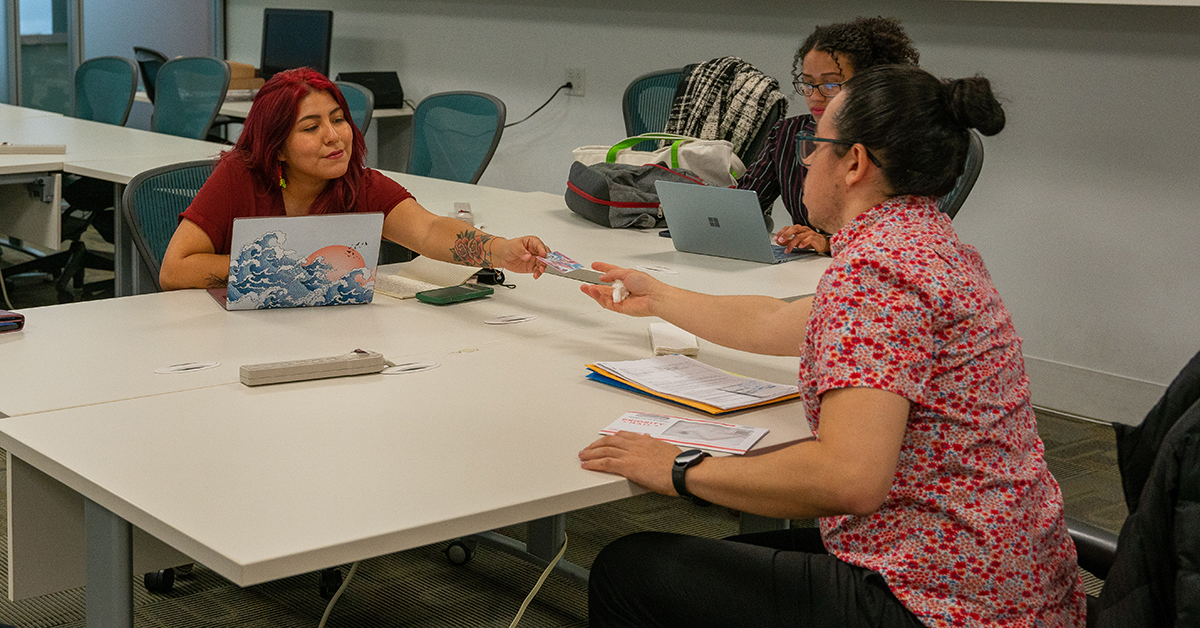Seven years.
His work as an advocate and an on-the-ground organizer for transgender sex workers incited death threats at gunpoint by armed motorcyclists, motivated a violent assault on his partner, and led to condemnation from the Venezuelan government, leaving him no choice but to flee to the United States in search of safety.
After arriving in the United States, Wendell, a prominent human rights activist and Immigrant and Non-Citizen Rights Clinic (INRC) client, was stuck in record immigration backlogs for seven years awaiting the opportunity to make his case for asylum. This spring, INRC students Jazmin Reynoso Ortiz and Raquel Morote changed everything.

Students, Jazmin Ortiz and Raquel Morote standing with client, Wendell, and Professor Nermeen Arastu in front of Main Street Legal Services sign.
Originating from Venezuela, Wendell has dedicated his life to fighting for those marginalized in Venezuelan and American society through his organization, Venezuela Diversa and, more recently an organization he helped form in the U.S., America Diversa. After meeting Venezuela Diversa founder in a class at their university in Caracas, Wendell was impassioned to join Venezuela Diversa’s efforts to advocate for transgender sex workers on Avenida Libertador, Caracas, and began distributing condoms and know-your-rights materials to the sex workers as a volunteer. He eventually became a Venezuela Diversa board member.
With the Venezuela Diversa team, Wendell worked collaboratively with and for the LGBTQ2IA+ community, advocating for the fundamental human rights of LGBTQ2IA+ individuals in Venezuela, such as the legal right to marry. He also carried out multi-faceted movement work: pushing for the enactment of legislation protecting gender identity and sexual diversity before the Venezuelan National Assembly, demanding the condemnation and prohibition of violence against transgender individuals in the Criminal Code, and pushing for the creation of a special department, focused on sexual diversity, in the Department of Protection of Citizens’ Rights to protect the rights of LGBTQ2IA+ people. He and his partner are known globally for their groundbreaking work in Venezuela.

Student Jazmin Ortiz counseling Wendell in INRC classroom
In the fall of 2022, due to INRC advocacy, U.S. Citizenship and Immigration Services (USCIS) finally scheduled Wendell’s asylum interview for October, and we hit the ground running. Our work in the Clinic began in August, when we finalized a voluminous legal filing summarizing Wendell’s experiences in Venezuela and briefing the reasons he qualified for asylum. For asylum-seekers who have the benefit of legal counsel, such filings often include hundreds, if not thousands, of pages of documents, legal briefings, expert declarations, and other supporting evidence.
The stress of this experience weighs heavily on asylum-seekers. Often, survivors of trauma in their home countries, asylum seekers are re-traumatized by a delay-ridden immigration system. We both recall how Wendell’s mental health gradually declined over the days leading up to the interview as we mooted him. sought out help from his therapist several times a week, and he had difficulties sleeping and being present. All he could think about was the interview and how his life and stability depended on the U.S. government granting him asylum.
Then, one week before the interview, our team received word from USCIS that the interview had been canceled without any explanation. We were devastated. All we could think about was how we would break the news to Wendell, who had spent dozens of hours reliving his trauma, in preparation for his interview.
Wendell is exceptionally resilient. He took the news better than we did, despite our inability to provide answers, such as why the interview had been canceled, and whether his interview would be rescheduled. He felt optimistic. He thanked us for all that we had done, specifically for working with him tirelessly to prepare him for the interview.
We launched into advocacy mode, pushing for the interview to be rescheduled, which it eventually was for February 2023. On his interview date, with his INRC legal counsel by his side, Wendell provided hours of testimony regarding his asylum claim. In March of 2023, weeks after the interview, Wendell received a much-anticipated notification from USCIS: “Your decision has been mailed.”
A few days after that initial notification, on a sunny Friday, we received a text message from Wendell in our group chat. “Can you jump on a call?” with a fingers crossed emoji. Our supervising Professor and Clinic Co-Director Nermeen Arastu immediately called. The decision has arrived!
“Raquel and Jazmin, Wendell has been granted asylum!!! Congratulations!!”
Reeling from the news, we congratulated Wendell and made plans to meet in person to discuss the benefits he would receive as an asylee. At the meeting, the INRC room was filled with hugs, joy, and so much gratitude: from Wendell to us and the Clinic, for the work and support throughout this long and exhausting process; and from us to him, for letting us amplify his voice, for the trust he granted us with and for the ability to learn firsthand how to truly be client-centered advocates.
Wendell plans to continue working with INRC. He is open to having students volunteer with America Diversa to work on various projects promoting the human rights of the LGBTQ2IA+ community. As young student attorneys, we are inspired by Wendell’s resilience and his unwavering commitment to grassroots organizing working that supports those harassed, policed, and marginalized by society.

Student Jazmin Ortiz and Raquel Morote counseling Wendell in INRC classroom
Notes from the Authors
Through the INRC, we gained so much experience, in both legal doctrine, as well as in becoming the type of attorneys we aim to be. Being able to work directly with a client on their asylum case was such a learning experience, and, to get their decision before our graduation, feels like a great start to our legal careers.
– Raquel Morote
Serving as a student attorney through the INRC has been an invaluable experience for me. Working with Wendell on his asylum case allowed me to engage in a client-centered framework and holistically consider his legal and non-legal needs and goals. My partner and I also employed a trauma-informed approach to ensure that, foremost, our client felt safe and comfortable, and sought to reduce the re-traumatization clients typically go through when they review their affidavits or are mooted. We also engaged in a collaborative relationship where Wendell was encouraged to actively participate in his own representation. All of these experiences have propelled me further in the direction of becoming a committed social justice lawyer.
-Jazmin Reynoso Ortiz
